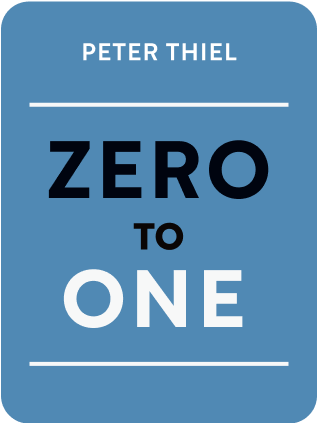

This article is an excerpt from the Shortform summary of "Zero To One" by Peter Thiel. Shortform has the world's best summaries of books you should be reading.
Like this article? Sign up for a free trial here .
What principles are contained in Peter Thiel’s Zero to One? What’s on his checklist for startup success?
Some animals have the drive to build things like dams, but only humans have the ability to invent entirely new things. In Zero to One, PayPal co-founder and venture capitalist Peter Thiel contends that creating new things is the best way to profit economically as well as the only path to human progress.
Read more for an overview of the book Zero to One by Peter Thiel.
Zero to One by Peter Thiel
Zero to One by Peter Thiel (in collaboration with Blake Masters) is about launching companies that create new things. It stems from a course Thiel taught at Stanford in 2012 on startups. Masters was a student in the class and his notes, which were widely shared online, evolved with Thiel’s partnership into this book.
Thiel contends that creating new things is both the best way for a company to profit and the only way for humans to progress. However, he is concerned that technological progress has stagnated today. Zero to One presents his solution to this problem: nurturing small startups developing revolutionary new technologies.
The ideas are drawn from Thiel’s experience as a tech entrepreneur and investor, but they don’t comprise a formula for success—no one can tell you how to be innovative, because every innovation is by definition new and unique. However, the key to success is to look for value where no one else is looking.
Thiel refers to developing new technologies as “going from zero to one,” because there are zero units of a product until you create the first one. He contrasts going from zero to one with going from “one to n,” by which he means making more of something that already exists.
In Thiel’s view, technology has stagnated today. Much of what companies produce today simply replicates what they produced yesterday or, at best, improves upon it incrementally. This is because it’s easier to replicate existing designs than to create new and fundamentally superior ones.
In business, each jump from 0 to 1 happens only once. The next Bill Gates won’t invent an operating system; the next Mark Zuckerberg won’t build a social network. The next innovator of the same caliber will build something unimagined to this point. Successful people don’t look for formulas or choose from existing options, they “rewrite the plan of the world.”
Unless companies create new things, they’ll eventually fail, regardless of how profitable they are today. There’s a limit to what we can gain by refining things, a point at which best practices won’t get us any further. We need to open new paths.
We need miracles, which only technology can produce. Technology enables us to do more and keep pushing the envelope of our capability.
Why It’s Important to Create New Things
Thiel argues that social progress requires technological progress, specifically “vertical” technological progress. He differentiates between horizontal and vertical progress as follows:
- Vertical progress creates new things: new products, new systems, and new ways of doing things. It involves “going from zero to one” because you’re creating something that’s the first of its kind.
- Horizontal progress produces more of something that already exists, perhaps with minor refinements along the way.
From the 1970s to the present, Thiel says vertical progress changed into horizontal progress, which led to greater competition for resources. He goes on to say that globalization is the ultimate example of horizontal progress. He argues that, if everyone is competing for the same resources, there won’t be enough to go around, leading to conflict instead of progress.
The Importance of Monopolies
Thiel asserts that horizontal progress and the competition it creates are bad for both business and society. Competition eats into your profits. His solution to the problem of competition is the technological monopoly, although your monopoly will last only until someone else invents a technology that eclipses it. The knowledge that your monopoly is temporary should motivate you to invest your profits in developing other new technologies.
Technology in the Future
But if creating new technology is the solution to the problem of competition, could our own creations someday start competing with us? In particular, as computers and artificial intelligence algorithms become increasingly advanced, will there come a time when computers compete with humans for jobs? Thiel says this is nothing to worry about. He argues that computers and artificial intelligence will only complement human workers—never replace them. This is because people and computers are good at different things.
How to Build a Great Startup Company: A Checklist for Success
Thiel stresses the importance of creating new technologies, both for businesses and for society as a whole. But how do you actually do that? According to Thiel, you do it by creating a startup company. Thiel goes on to offer his advice on the particulars of creating a successful startup, listing what he considers the elements of a strong startup venture.
- Revolutionary Technology: What great opportunity have you identified that everyone else has overlooked?
- Strategic Timing: Is it the right time to produce and market your revolutionary technology?
- A Great Team: Is your team unified by your company’s unique mission? Have you chosen leaders who know each other well enough to be sure that both their technical skills and their personalities are complementary? Who will legally own the company? Who will make the high-level decisions about what the company will do? Who will figure out how to accomplish the company’s high-level objectives and take responsibility for getting the work done?
- Effective Distribution: What’s your customer lifetime value? What’s your customer acquisition cost? Does your marketing strategy fit your customer acquisition cost?
- Enduring Value: Are you building a monopoly that will generate long-term profits?
If any of these elements is weak, the startup is likely to fail. But if you’ve got all of them in good order, you’re on your way to building a great business.

———End of Preview———
Like what you just read? Read the rest of the world's best summary of Peter Thiel's "Zero To One" at Shortform .
Here's what you'll find in our full Zero To One summary :
- Why some companies genuinely move the world forward when most don't
- How to build a company that becomes a monopoly (and why monopolies aren't bad)
- Silicon Valley secrets to selling products and building rockstar teams






